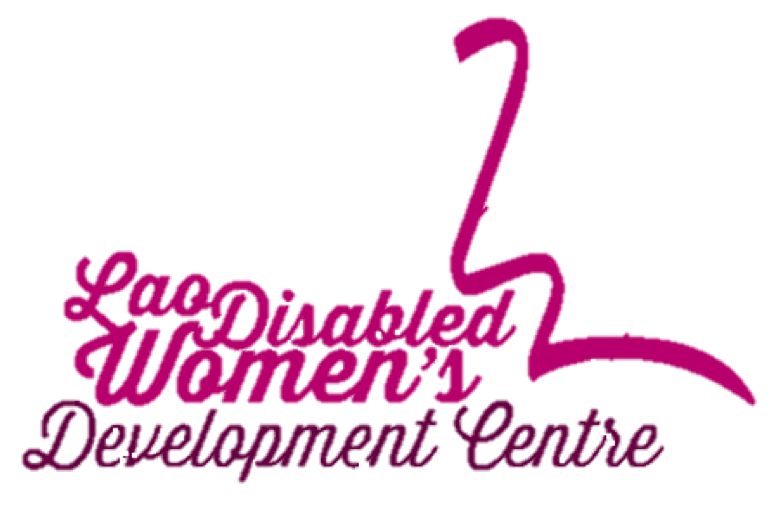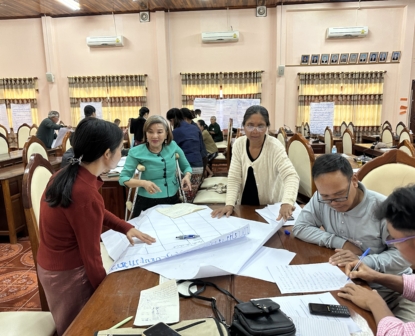Project
Strengthen Organisation of People with Disabilities
-
Amount Funded
151,288 EUROProject Duration
13 Aug 2021 - 12 Dec 2023 -
-
Lead organisation
Lao Disabled Women’s Development Centre
-
The Lao Disabled Women’s Development Centre (LDWDC) was established in 2001 as a non-profit organisation and is registered under the Ministry of Labour and Social Welfare. It is run by women with disabilities, primarily for women with disabilities and their families in Lao PDR. The LDWDC developed their strategic plan 2018-2022, which is in the process of finalization. Their vision is to have an inclusive society where people with disabilities are living independently and have equal rights and opportunities to access healthcare, education, employment and services to enable them to achieve their full potential. Their mission is to empower women with disabilities in Laos to be fully participating and contributing members of the community. Their priorities are to develop the potential of women with disabilities, advocate on behalf of women with disabilities to raise community awareness, provide reliable, sustainable and culturally appropriate client services, and promote growth and sustainability of the organisation through effective resource management. LDWDC provides vocational and life skills training to women with disabilities in the areas of sewing, weaving, recycled paper products, IT, English, social services and development and small business. LDWDC provides training in their centre in Vientiane Capital and short courses in different provinces throughout Laos. The centre of LDWDC is a handicraft production unit that employs around 34 trained women with disabilities. LDWDC supports trained students to find decent work or/and start small businesses. LDWDC expanded its activities to advocacy at national and local levels in relation to gender, disability inclusion, and policy dialogue and legislation development. In their advocacy, they have broadened their scope to include all women, girls, men and boys with disabilities. Over the years, LDWDC staff received a series of capacity development training on relevant topics such as leadership, project management, small business management, health care and reproductive health.
-
Organisation
The Lao Disabled Women’s Development Centre (LDWDC) was established in 2001 as a non-profit organisation and is registered under the Ministry of Labour and Social Welfare. It is run by women with disabilities, primarily for women with disabilities and their families in Lao PDR. The LDWDC developed their strategic plan 2018-2022, which is in the process of finalization. Their vision is to have an inclusive society where people with disabilities are living independently and have equal rights and opportunities to access healthcare, education, employment and services to enable them to achieve their full potential. Their mission is to empower women with disabilities in Laos to be fully participating and contributing members of the community. Their priorities are to develop the potential of women with disabilities, advocate on behalf of women with disabilities to raise community awareness, provide reliable, sustainable and culturally appropriate client services, and promote growth and sustainability of the organisation through effective resource management. LDWDC provides vocational and life skills training to women with disabilities in the areas of sewing, weaving, recycled paper products, IT, English, social services and development and small business. LDWDC provides training in their centre in Vientiane Capital and short courses in different provinces throughout Laos. The centre of LDWDC is a handicraft production unit that employs around 34 trained women with disabilities. LDWDC supports trained students to find decent work or/and start small businesses. LDWDC expanded its activities to advocacy at national and local levels in relation to gender, disability inclusion, and policy dialogue and legislation development. In their advocacy, they have broadened their scope to include all women, girls, men and boys with disabilities. Over the years, LDWDC staff received a series of capacity development training on relevant topics such as leadership, project management, small business management, health care and reproductive health.
-
Project
Strengthen Organisation People with Disabilities (OPDs) and the Disability movement to effectively advocate for the inclusion of people with disabilities across all impairment groups at the national level and in Attapeu Province, Sekong Province, Xiangkhouang Province and Vientiane capital. The government of the Lao PDR has adhered to a number of international treaties: it has ratified the Convention on the Rights of Persons with Disabilities (CRPD) in 2009 and acceded to the Convention on the Rights of the Child (CRC) in 1991. Whilst the government of the Lao PDR ratified the CRDP in 2009 and issued the Decree on the Rights of People with Disabilities in 2014, neither carries the force of law and the Lao PDR is yet to become a fully inclusive society. The 2015 Population and Housing Census have largely underestimated the number of people with disabilities in the country. It has identified around 160,881 persons with disabilities or 2.8% of the population in stark contrast with estimates provided by WHO in their World Disability Report indicating that people with disabilities represent 15% of the world population. There is very little information on people with disabilities from minority ethnic groups living in remote areas and given the level of poverty and lack of quality basic services these groups are faced with, people with disabilities are among the most deprived. Since 2015, The National Committee for Disabled People and the Elderly (NCDE), under the MOLSW, is leading the development of two main documents: The National Policy for Persons with Disabilities and the National Strategy and Action Plan for Persons with Disabilities. NCDE is working closely with line ministries, OPDs, INGOs and coordinate several consultation meetings. The 2 documents are finalized and have been submitted to the Ministry. In parallel, NCDE drafted a Disability Law that was reviewed by the National Assembly in December 2018. However, the government of Laos has not yet enacted this law. In spite of this legal and strategic framework promoting disability inclusion (the Decree on the rights of persons with disabilities, the Disability law, national policy, strategy, and action plan), the reality of the legal context of disability in Lao PDR does not guarantee the rights to health, education, employment, leisure activities, communication and information as well as mobility, for persons with disabilities. These problems include:
- The fact that the ratified Convention on the Rights of Persons with Disabilities (2009) is not implemented effectively. This limits the obligations of Lao PDR to uphold the rights of persons with disabilities.
- The lack of recognition of the special needs of persons with disabilities and the general lack of knowledge of disability issues from political and administrative authorities.
- The non-systematic application of the Lao legal framework that includes the Decree on the Rights of Persons with Disabilities, which sets out, “protects and promotes the rights of people with disabilities, in areas that affect their everyday lives: access to healthcare, inclusive education, vocational training and employment and specify entitlements to lower or zero fees to use these services” (2014).
-
-
Strengthen Organisation People with Disabilities (OPDs) and the Disability movement to effectively advocate for the inclusion of people with disabilities across all impairment groups at the national level and in Attapeu Province, Sekong Province, Xiangkhouang Province and Vientiane capital. The government of the Lao PDR has adhered to a number of international treaties: it has ratified the Convention on the Rights of Persons with Disabilities (CRPD) in 2009 and acceded to the Convention on the Rights of the Child (CRC) in 1991. Whilst the government of the Lao PDR ratified the CRDP in 2009 and issued the Decree on the Rights of People with Disabilities in 2014, neither carries the force of law and the Lao PDR is yet to become a fully inclusive society. The 2015 Population and Housing Census have largely underestimated the number of people with disabilities in the country. It has identified around 160,881 persons with disabilities or 2.8% of the population in stark contrast with estimates provided by WHO in their World Disability Report indicating that people with disabilities represent 15% of the world population. There is very little information on people with disabilities from minority ethnic groups living in remote areas and given the level of poverty and lack of quality basic services these groups are faced with, people with disabilities are among the most deprived. Since 2015, The National Committee for Disabled People and the Elderly (NCDE), under the MOLSW, is leading the development of two main documents: The National Policy for Persons with Disabilities and the National Strategy and Action Plan for Persons with Disabilities. NCDE is working closely with line ministries, OPDs, INGOs and coordinate several consultation meetings. The 2 documents are finalized and have been submitted to the Ministry. In parallel, NCDE drafted a Disability Law that was reviewed by the National Assembly in December 2018. However, the government of Laos has not yet enacted this law. In spite of this legal and strategic framework promoting disability inclusion (the Decree on the rights of persons with disabilities, the Disability law, national policy, strategy, and action plan), the reality of the legal context of disability in Lao PDR does not guarantee the rights to health, education, employment, leisure activities, communication and information as well as mobility, for persons with disabilities. These problems include:
- The fact that the ratified Convention on the Rights of Persons with Disabilities (2009) is not implemented effectively. This limits the obligations of Lao PDR to uphold the rights of persons with disabilities.
- The lack of recognition of the special needs of persons with disabilities and the general lack of knowledge of disability issues from political and administrative authorities.
- The non-systematic application of the Lao legal framework that includes the Decree on the Rights of Persons with Disabilities, which sets out, “protects and promotes the rights of people with disabilities, in areas that affect their everyday lives: access to healthcare, inclusive education, vocational training and employment and specify entitlements to lower or zero fees to use these services” (2014).
-
Through the project, disabled women and girls in Lao PDR gained access to treatment and healthcare, vocational training, and employment opportunities, allowing them to support themselves and their families, live honourably in society, and contribute to the nation’s social and economic development one by one. By providing vocational training for disabled women in disciplines such as sewing, producing paper and computer processing combined with English, mathematics, peacebuilding, social development, and small business management, LDWDC created opportunities and conditions for women and girls to access livelihoods.
This was complemented by training on disability rights and disability laws, strategies and national action plans for disabled people, as well as the role of women and men in national and international institutions and organisations. In collaboration with the government, social organisations, disabled families, disabled couples, and disabled girls participated in the expansion of disability laws. In the process, they encouraged and cultivated public awareness of the importance of building facilities and ensuring the safety of disabled people when traveling or using public transportation. This not only raised awareness on these issues, but also developed the leadership skills in disabled women and disabled girls, who became stronger and more independent as a result.
“Our community of women with disabilities supports each other, and we encourage women with disabilities to be independent by offering training in income-generating activities and life skills, and we educate women about their civil rights. We empower women. We help women to become leaders in society. When the world says it is not possible, the LDWDC says: YES, it Is possible!” – LDWDC team
Media:
Website:
YouTube videos:
https://www.youtube.com/watch?v=dRMPaEsQrWw
https://www.youtube.com/watch?v=qr5GVqRk0s4
https://www.youtube.com/watch?v=mIReuKuNOaQ
- News




